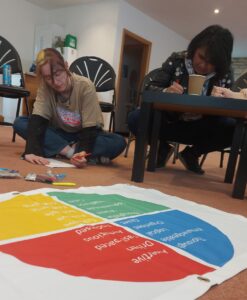
Neurodiversity refers to the natural variation in the human brain and how it functions. This includes conditions such as autism, ADHD, dyslexia, and many others. As one in seven people are recognised to be neurodiverse in the UK, it is inevitable that a percentage of young people who attend our workshops will experience some form of neurodiversity. We often work with groups of young people who are unemployed and it is a sad fact that only one in six people with autism have a job. While neurodiverse young people may experience challenges, they also possess unique strengths and abilities. It is important to support and celebrate these strengths, while also providing appropriate accommodations to help them thrive. Here’s how at The Colour Works Foundation we are trying to champion and support our neurodiverse young people.
- We recognise the strengths of neurodiverse young people
Neurodiverse young people often possess unique strengths and abilities. For example, individuals with autism may have exceptional attention to detail and excel in tasks that require visual-spatial abilities. Those with ADHD may be highly creative and innovative thinkers. Dyslexic individuals may have excellent verbal skills and excel in oral communication. Recognising and celebrating these strengths can help to build confidence and self-esteem in neurodiverse young people.
- We adapt workshop delivery or activities where possible
We try to recognise where neurodiverse young people would engage better in our workshops by adapting our delivery or recognising where activities need to be modified. For example – providing a clear format for workshop structure at the beginning of the session can help those who need routine.
- Foster a supportive and inclusive environment
Creating a supportive and inclusive environment is crucial for the success of neurodiverse young people. We encourage all our young people to work in groups and develop their social interactions.
- Encourage self-advocacy
Encouraging neurodiverse young people to advocate for themselves can help them to develop important skills and increase their independence. Our workshops help with communication skills that enable young people to clearly share their needs and preferences. We also explore self-management and enabling young people to develop strategies for self-regulation.
We have found that supporting neurodiversity in young people involves recognising and celebrating their unique strengths, adapting our workshops, creating a supportive environment and encouraging self-advocacy. By embracing neurodiversity, we can help to create a more inclusive and accepting society where all young people can thrive.
